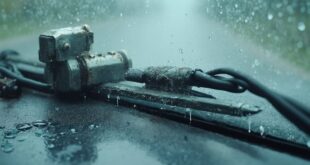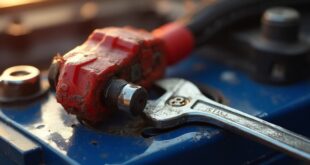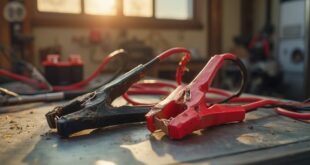If you're experiencing a bad or failing starter relay, watch for these four signs: your vehicle might not start at all, the starter could remain engaged even after the engine fires up, you may face intermittent starting issues, or hear clicking sounds when you try to start. Ignoring these symptoms can lead to bigger problems down the road. Stay tuned for more insights into how to identify and fix these issues effectively.
Vehicle Won't Start
When your vehicle won't start, it can often point to a bad starter relay. You might turn the key and hear nothing, or just a clicking sound, indicating that the relay isn't sending power to the starter motor.
Sometimes, dirt or heat contamination can cause intermittent starting issues, making it frustrating when you try to get going. If you've ruled out the battery and other components, the starter relay could be the culprit.
Addressing this issue early can save you from a complete failure, so pay attention to these warning signs and act promptly when they arise.
Starter Remains Engaged
A persistent issue with a starter relay can cause the starter to remain engaged even after the engine is running. This often happens due to welded contacts within the relay, which fail to disconnect when you release the ignition switch.
If you notice the starter whirring while the engine is already on, it's a clear sign of trouble. Not only can this lead to unnecessary wear on the starter motor, but it can also drain your battery.
Addressing this issue promptly can prevent further damage and save you from costly repairs down the line.
Intermittent Starting Issues
Experiencing intermittent starting issues can be just as frustrating as a starter that won't disengage. You might turn the key, and sometimes the engine roars to life, while other times, it just sits silent.
This inconsistency often points to a failing starter relay, possibly affected by dirt or heat. These contaminants can disrupt the electrical flow, causing unreliable performance.
If this happens to you, it's crucial to investigate further. Ignoring the issue may lead to complete failure, leaving you stranded.
Stay proactive and consider checking your relay to avoid those unexpected starting dilemmas.
Clicking Sounds When Starting
If you hear clicking sounds when trying to start your vehicle, it could signal a problem with the starter relay. This noise often indicates that the battery's amperage is low or that the relay itself is damaged.
When the relay fails, it struggles to send the necessary power to the starter motor, resulting in those frustrating clicks instead of a smooth start. Ignoring this issue can lead to more severe problems down the line, so it's wise to address it quickly.
Check your battery and relay to guarantee everything's functioning properly before it escalates into a complete failure.
Frequently Asked Questions
How Can I Test if My Starter Relay Is Faulty?
To test your starter relay, you can use a multimeter to check for continuity. Alternatively, swap it with a similar relay in your vehicle to see if the starting issue resolves.
Can a Bad Starter Relay Drain My Car Battery?
Yes, a bad starter relay can drain your car battery. If the relay gets stuck or malfunctions, it may keep the starter engaged, leading to unnecessary battery drain even when the vehicle's off.
What Are Common Causes of Starter Relay Failure?
Common causes of starter relay failure include heat exposure, dirt accumulation, and electrical issues. If you notice intermittent starting problems or strange sounds, it might be time to inspect or replace the relay before further complications arise.
How Do I Locate the Starter Relay in My Vehicle?
To locate your starter relay, check under the hood in the power distribution center or look in the cabin's fuse block. Refer to your service manual for specific instructions for your vehicle model.
Is It Safe to Drive With a Failing Starter Relay?
Driving with a failing starter relay isn't safe. You might experience starting issues or unexpected engine engagement. It's best to address the problem promptly to avoid being stranded or causing further damage to your vehicle.
 Car Service Land Coupons for Oil change, Tires, Wheel alignment, Brakes, Maintenance
Car Service Land Coupons for Oil change, Tires, Wheel alignment, Brakes, Maintenance




